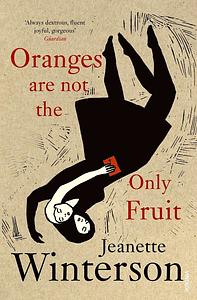You need to sign in or sign up before continuing.
Take a photo of a barcode or cover
challenging
emotional
funny
hopeful
inspiring
reflective
sad
medium-paced
Plot or Character Driven:
A mix
Strong character development:
Yes
Loveable characters:
Complicated
Diverse cast of characters:
Yes
Flaws of characters a main focus:
Yes
Winterson’s writing is funny, deep and so beautiful. I can’t wait to read more from her! I highly recommend this book
I knew that this is considered a modern classic and a fundamental LGBTQ novel. I also knew it was about a young girl being raised by a fundamentalist Christian mother in 1960s North England. So I thought it would be dreary and depressing.
Imagine my surprise when it was quite humorous. It has that dry British humor of a comedy of manners or a Jeeves book. Jeanette (the character, not the author) is a bold, earnest, spirited girl who grows into a bold, earnest, spirited young woman. Her cheeky narration as a child is amusing, and is compounded by the ridiculousness of Jeanette's mother and the other church members.
Although there is still humor in the later portion, Jeanette's clear-eyed view of life as a teenager is clouded when her mother and her church reject her because she loves other girls. She is still bold and earnest and spirited, but she is now an outcast who has to find her own way.
Given that religion permeates every aspect of Jeanette's life, it is fitting that each section is named after a book of the Bible and that there are long passages of parables.
This is one of those books that I want to take a class on, because it feels like there is so much to explore and discuss. It is one that both entertains and makes you want to delve deeper into it.
Imagine my surprise when it was quite humorous. It has that dry British humor of a comedy of manners or a Jeeves book. Jeanette (the character, not the author) is a bold, earnest, spirited girl who grows into a bold, earnest, spirited young woman. Her cheeky narration as a child is amusing, and is compounded by the ridiculousness of Jeanette's mother and the other church members.
Although there is still humor in the later portion, Jeanette's clear-eyed view of life as a teenager is clouded when her mother and her church reject her because she loves other girls. She is still bold and earnest and spirited, but she is now an outcast who has to find her own way.
Given that religion permeates every aspect of Jeanette's life, it is fitting that each section is named after a book of the Bible and that there are long passages of parables.
This is one of those books that I want to take a class on, because it feels like there is so much to explore and discuss. It is one that both entertains and makes you want to delve deeper into it.
I'll be honest...I had sworn off Jeanette Winterson for awhile after I was introduced to her work through Written on the Body. The truth is, I'm just more of a straightforward narrative kind of girl, and though I love narrative poetry, I've realized that I don't so much love poetic narrative, at least not Winterson's kind.
Still, how could I pass up Oranges are Not the Only Fruit? It seemed like it would be a seminal work for me, both in terms of its feminism, it's importance historically as one of the first widely-read coming out novels, and its focus on a repressive religious upbringing (one of my favorite topics). And I did love the plot. I thought it was honestly and bravely written. This novel resists the redemptive ending, and as a result, I felt trapped along with Jeanette in this crazy world constructed by her adoptive mother.
Now, what to do with the poetic/mythological interludes? In many ways, they just aren't my thing, and I found myself skimming over them to get to the "real" portions of the novel. After finishing the novel, though, I think I appreciate them a bit more, especially if one reads them as the poetic representations of a fragmented persona, one trying to deal with a reality that is both traumatic and repressive. Perhaps it is in these sections that we do find a bit of redemption for the protagonist, a bit of fragmented hope.
Overall, I've never read anything quite like this novel, and I'm glad for the experience. I'm also looking forward to reading Winterson's "Why Be Happy When You Could Be Normal?" which is supposed to be her nonfiction account of events in this novel. I wonder if she'll maintain her poetic/mythical interludes, or if, perhaps, her adult voice will be more confident and less fragmented, able to tell the whole story from a removed vantage point (temporally-speaking) in which the author is truly able to love herself.
Either way, I'll be sure to let you know!
Still, how could I pass up Oranges are Not the Only Fruit? It seemed like it would be a seminal work for me, both in terms of its feminism, it's importance historically as one of the first widely-read coming out novels, and its focus on a repressive religious upbringing (one of my favorite topics). And I did love the plot. I thought it was honestly and bravely written. This novel resists the redemptive ending, and as a result, I felt trapped along with Jeanette in this crazy world constructed by her adoptive mother.
Now, what to do with the poetic/mythological interludes? In many ways, they just aren't my thing, and I found myself skimming over them to get to the "real" portions of the novel. After finishing the novel, though, I think I appreciate them a bit more, especially if one reads them as the poetic representations of a fragmented persona, one trying to deal with a reality that is both traumatic and repressive. Perhaps it is in these sections that we do find a bit of redemption for the protagonist, a bit of fragmented hope.
Overall, I've never read anything quite like this novel, and I'm glad for the experience. I'm also looking forward to reading Winterson's "Why Be Happy When You Could Be Normal?" which is supposed to be her nonfiction account of events in this novel. I wonder if she'll maintain her poetic/mythical interludes, or if, perhaps, her adult voice will be more confident and less fragmented, able to tell the whole story from a removed vantage point (temporally-speaking) in which the author is truly able to love herself.
Either way, I'll be sure to let you know!
emotional
funny
hopeful
reflective
medium-paced
Plot or Character Driven:
Character
Strong character development:
Complicated
Loveable characters:
Complicated
Diverse cast of characters:
No
Flaws of characters a main focus:
Yes
This book reminds me of why I want to write about books for the rest of my life.
challenging
emotional
funny
reflective
medium-paced
Plot or Character Driven:
Character
Strong character development:
Yes
Loveable characters:
Yes
Diverse cast of characters:
No
Flaws of characters a main focus:
Complicated
i didnt enjoy this one quite so much as gut symmetries - but still loved jeanettes style of writing and the mix between real and fantasy, as well as her depiction of the complex mother-daughter relation
slow-paced
medium-paced
challenging
dark
reflective
sad
tense
medium-paced
Plot or Character Driven:
A mix
Strong character development:
Yes
Loveable characters:
Complicated
Diverse cast of characters:
Yes
Flaws of characters a main focus:
Complicated
Graphic: Homophobia, Toxic relationship, Religious bigotry




